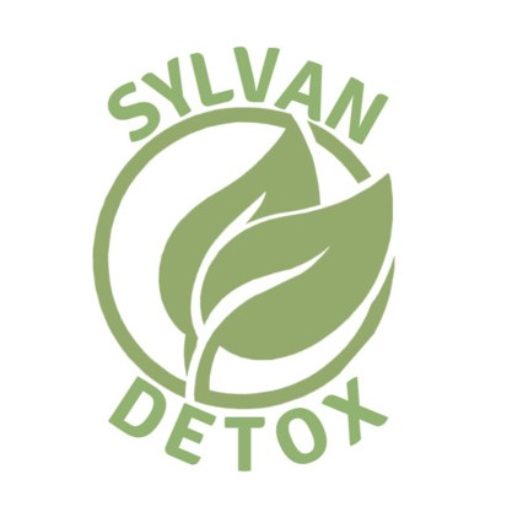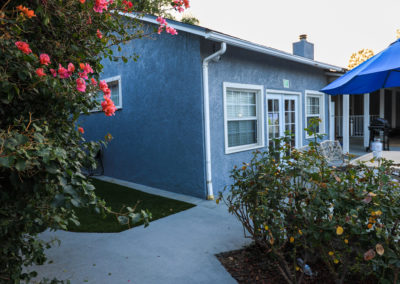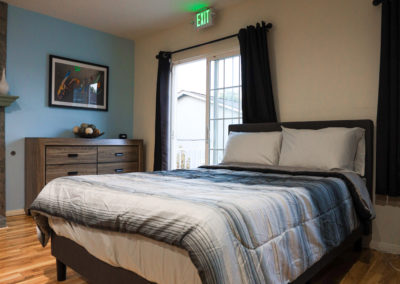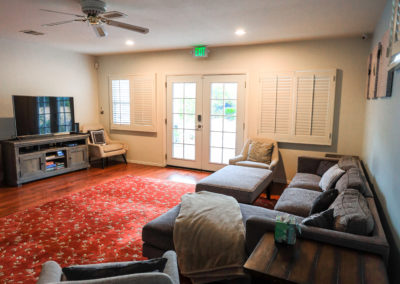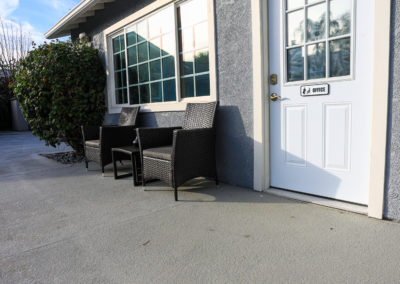Top Rated Residential Drug Rehab Program in Beverly Hills
Sylvan Detox is a top-rated drug and alcohol rehab center that provides residents of Beverly Hills with top-tier addiction treatment. We provide treatment for clients who have addictions to prescription drugs or illicit drugs. Our treatment programs include medical detox, inpatient treatment, and outpatient treatment programs. Each client can expect an individualized treatment plan that includes medically sanctioned treatments as well as holistic therapies designed to support their health. By enrolling in residential treatment now, you can end your dependence on drugs and get the support you need to achieve lasting recovery.
Table of Contents
- What Is Inpatient Rehab?
- What Is Inpatient Drug Rehab Like?
- What To Expect During Residential Rehab
- How Long Does Inpatient Rehab in Beverly Hills Last?
- 30 Day Rehab
- 60 Day Rehab
- 90 Day Rehab
- Executive Drug Rehab in Los Angeles
- Breathwork Therapy
- Cognitive Behavioral Therapy
- Dialectical Behavioral Therapy
- Family Systems Therapy
- Trauma-Informed Therapy
- Why Choose Sylvan Detox For Residential Drug Rehab
What Is Inpatient Rehab?
Inpatient rehab allows clients to immerse themselves in therapy without outside distractions. During inpatient rehab, clients have access to 24-hour support, which is ideal for people who are just beginning their recovery journey and may feel unstable and at risk of relapse. Inpatient rehab programs offer the most intensive level of support. During the length of their program, clients reside in rehab. Highly structured programming helps them build a strong framework for their recovery.
What Is Inpatient Drug Rehab Like?
At Sylvan Detox, we’ve developed a luxury rehab setting complemented by high-quality addiction treatment and amenities. We want clients to feel comfortable and safe as they begin their recovery journey. We find that clients who feel comfortable in their environment have an easier time focusing on their therapies. Our residential rehab features a positive atmosphere where everyone is treated with dignity and respect. Clients spend the majority of each day in therapy, but there is also considerable downtime where clients can relax or enjoy our amenities as they heal and learn how to manage their addiction successfully.
What To Expect During Residential Rehab
When enrolling in residential rehab at Sylvan Detox, clients can expect individualized treatment plans. For instance, not all clients prefer to include family therapy in their plan or require dual diagnosis treatment. Others do. Some clients begin their treatment plan with medical detox. After detox, they can begin their rehab treatment plan. Our plans include conventional medical treatments like cognitive behavioral therapy and holistic treatments like nutrition. Clients attend therapy sessions during the day with relaxing breaks included in their schedules. In the evenings, they’re able to enjoy our amenities or simply relax in their room.
During their stay, clients can expect empathetic support from our clinicians. We strive to provide the help that clients need to move forward in their recovery journey. Adjusting to sobriety has its ups and downs, which is why our 24-7 support is so helpful. The initial recovery process is usually the hardest, which is why clients don’t have to go it alone. We’re there for them, helping them learn to manage their addiction more effectively each day.
How Long Does Inpatient Rehab in Beverly Hills Last?
Most Beverly Hills inpatient rehab programs last 30, 60, or 90 days. If, after a month-long program a person still feels unstable, they can extend their program. This way, they have more time and support to grow in their ability to manage their addiction. Substance use disorders are extremely complex. Spending a few weeks in rehab often isn’t enough time for a person to learn to cope with their condition and its triggers effectively. Recovery is a long-term process, but with gradual change complemented by sound relapse prevention strategies, people can achieve their recovery goals.
30 Day Rehab
Spending 30 days in treatment in addiction treatment is generally regarded as the minimum time a person needs to achieve their recovery milestones. During these programs, clients learn to identify their triggers to abuse drugs and then develop strategies for managing them. Since many unhealthy behaviors are governed by problematic thoughts and emotions, clients need to address those patterns of thinking and coping with negative feelings and stress so they can prevent relapse.
These types of changes take time, and for many, 30 days may not be long enough. However, some people choose to transition to outpatient therapy after completing their inpatient program. That way, they can continue to receive support as they begin to rebuild their lives.
60 Day Rehab
Some people spend 60 days getting treatment for their substance use disorder. A person who is still unstable at the 30-day point is vulnerable to relapse. Spending additional time getting support ensures that clients meet important recovery milestones before they return to their homes and their responsibilities and stressors. A person who has been addicted for many years has poly-drug addictions, or has a dual diagnosis may require a longer rehab stay.
90 Day Rehab
Some individuals benefit from a longer-term program, spending 90 days in rehab. In the scheme of things, a person who has spent years addicted to drugs may find that 30-60 days of inpatient treatment doesn’t meet their more intensive needs. A longer program gives them time and support to make the changes they need to achieve lasting sobriety. Someone who has been abusing drugs since they were a teen may need a longer-term rehab stay. Plus, research shows that the more time a person spends in rehab, the less likely they’ll be to relapse.
Executive Drug Rehab in Beverly Hills
Sylvan Detox features executive rehab services and amenities for residents of Beverly Hills. We offer world-class addiction treatment programs that blend evidence-based treatments with holistic and alternative treatment options designed to support whole-person health. We also offer a wide range of amenities such as chef-prepared meals and a comfortable environment. If you’re searching for executive drug rehab in Beverly Hills, you’ll want to explore our services and amenities that attract professional clientele.
Breathwork Therapy
Some rehabs offer breathwork therapy as an addiction treatment. Breathwork therapy is also useful for people who have certain mental health conditions such as anxiety. During these treatment sessions, clients learn how to focus on various breathing techniques. Doing so can help them control stress. People can’t always remove themselves from stressful situations; breathwork therapy encompasses techniques they can use when they’re attempting to ward off stress and manage their discomfort. Unmanaged stress and negative emotions can be triggers for relapse.
Cognitive Behavioral Therapy
Cognitive behavioral therapy is an evidence-based therapy used to treat substance use disorders (as well as other mental and behavioral health conditions). Evidence-based therapies have the support of the medical community and have been safe and effective forms of treatment for the disorder in question. During CBT treatment sessions, therapists work with clients to help them explore and evaluate the connections between their thoughts, feelings, and behaviors–particularly the unhealthy thoughts and feelings that impact their drug abuse. Then, they can begin to develop strategies to manage those connections in healthier ways.
Dialectical Behavioral Therapy
Similar to cognitive behavioral therapy, dialectical behavioral therapy focuses on helping clients manage stress and unhealthy emotions better. Distress tolerance is a cornerstone of this therapy. Since stress and negative emotions are powerful triggers for people to drink or use drugs, an improved ability to tolerate this distress helps prevent relapse. Like CBT, DBT is an evidence-based treatment for substance use disorders.
Family Systems Therapy
Some clients and their families benefit from family systems therapy. Substance use disorders can impact families to a great extent. Family therapists help family members understand their loved one’s condition and how to provide healthful forms of support. Therapists also help them confront issues within their relationships, promoting healing and better ways of interacting with one another. In situations where family relationships have become damaged in the wake of drug abuse problems, family therapy can help each move forward to achieve more fulfilling, healthier relationships with one another.
Trauma-Informed Therapy
It’s not uncommon for people with drug addictions to have experienced traumatic experiences in their past. Particularly useful for treating clients who have post-traumatic stress disorder, trauma-informed therapy is also ideal for helping other clients who have witnessed or experienced stress that may be a trigger for their drug or alcohol use. Therapists help clients find healthier ways to cope with past trauma so that it doesn’t derail their recovery progress in the future.
Why Choose Sylvan Detox For Residential Drug Rehab
Sylvan Detox has a reputation as a leading Beverly Hills rehab center. We help clients put their drug addiction behind them and embrace a healthier future. Residential rehab is an opportunity for clients to focus exclusively on their health and recovery. Without outside distractions, they can make great strides forward, learning to manage their triggers and keep relapse at bay.
Our clinicians treat the whole person–not simply the addiction. We feature conventional and holistic therapies that support physical and psychological well-being. Drug addiction is a complex condition that involves physical and mental aspects. By treating each aspect of addiction, we’re able to help our clients build a strong recovery foundation.
If you are addicted to drugs or alcohol, call Sylvan Detox to learn more about our inpatient treatment programs. We can help you begin your enrollment and start your journey to long-term recovery.
